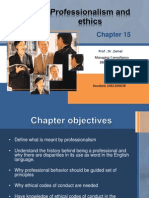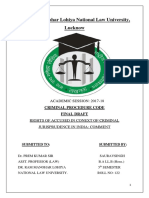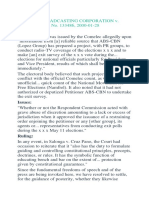University of Petroleum and Energy Studies College of Legal Studies Dehradun Interpretation of Statutes
University of Petroleum and Energy Studies College of Legal Studies Dehradun Interpretation of Statutes
Uploaded by
abhishekchhabra362Copyright:
Available Formats
University of Petroleum and Energy Studies College of Legal Studies Dehradun Interpretation of Statutes
University of Petroleum and Energy Studies College of Legal Studies Dehradun Interpretation of Statutes
Uploaded by
abhishekchhabra362Original Description:
Original Title
Copyright
Available Formats
Share this document
Did you find this document useful?
Is this content inappropriate?
Copyright:
Available Formats
University of Petroleum and Energy Studies College of Legal Studies Dehradun Interpretation of Statutes
University of Petroleum and Energy Studies College of Legal Studies Dehradun Interpretation of Statutes
Uploaded by
abhishekchhabra362Copyright:
Available Formats
UNIVERSITY OF PETROLEUM AND ENERGY STUDIES COLLEGE OF LEGAL STUDIES DEHRADUN INTERPRETATION OF STATUTES
CASE ANALYSIS
SUBMITTED TO: Prof Ashish Verma [COLS]
SUBMITTED BY: Abhishek Chhabra BA LLB (VII Sem) 500011974(5)
State Of Rajasthan vs Babu Ram1
The word "person" has not been defined in the Narcotic Drugs and Psychotropic Substances Act, 1985. One of the basic principles of interpretation of Statutes is to construe the words according to their plain, literal and grammatical meaning. The word "person" has not been defined in the Act. Section 2(xxix) of the Act says that the words and expressions used herein and not defined but defined in the Code of Criminal Procedure have the meanings respectively assigned to them in that Code. The Code, however, does not define the word "person". Section 2(y) of the Code says that the words and expressions used therein and not defined but defined in the Indian Penal Code, 1860 have the meanings respectively assigned to them in that Code. Section 11 of the Indian Penal Code says that the word "person" includes any Company or Association or body of persons whether incorporated or not. Similar definition of the word "person" has been given in Section 3(42) of the General Clauses Act. Therefore, these definitions render no assistance for resolving the controversy in hand.. One of the basic principles of interpretation of Statutes is to construe them according to plain, literal and grammatical meaning of the words. If that is contrary to, or inconsistent with, any express intention or declared purpose of the Statute, or if it would involve any absurdity, repugnancy or inconsistency, the grammatical sense must then be modified, extended or abridged, so far as to avoid such an inconvenience, but no further. The onus of showing that the words do not mean what they say lies heavily on the party who alleges it. He must advance something which clearly shows that the grammatical construction would be repugnant to the intention of the Act or lead to some manifest absurdity.. In the well known treatise - Principles of Statutory Interpretation by Justice G.P. Singh, the learned author has enunciated the same principle that the words of the Statute are first understood in their natural, ordinary or popular sense and phrases and sentences are construed according to their grammatical meaning, unless that leads to some absurdity or unless there is something in the context or in the object of the Statute to suggest the contrary. . A bag, briefcase or any such article or container, etc. can, under no circumstances, be treated as body of a human being. They are given a
1
AIR 2007 SC 2018
separate name and are identifiable as such. They cannot even remotely be treated to be part of the body of a human being. Depending upon the physical capacity of a person, he may carry any number of items like a bag, a briefcase, a suitcase, a tin box, a thaila, a jhola, a gathri, a holdall, a carton, etc. of varying size, dimension or weight. Therefore, it is not possible to include these articles within the ambit of the word "person" occurring in Section 50 of the Act The scope and ambit of Section 50 of the Act was examined in considerable detail by a Constitution Bench in State of Punjab v. Baldev Singh (1999 (6) SCC 172)and para 12 of the reports is being reproduced below : "12. On its plain reading, Section 50 would come into play only in the case of a search of a person as distinguished from search of any premises etc. However, if the empowered officer, without any prior information as contemplated by Section 42 of the Act makes a search or causes arrest of a person during the normal course of investigation into an offence or suspected offence and on completion of that search, a contraband under the NDPS Act is also recovered, the requirements of Section 50 of the Act are not attracted." The Bench recorded its conclusion in para 57 of the reports and sub-paras (1), (2), (3) and (6) are being reproduced below : "57. On the basis of the reasoning and discussion above, the following conclusions arise: (1) That when an empowered officer or a duly authorized officer acting on prior information is about to search a person, it is imperative for him to inform the person concerned of his right under Sub-section (1) of Section 50 of being taken to the nearest gazetted officer or the nearest Magistrate for making the search. However, such information may not necessarily be in writing. (2) That failure to inform the person concerned about the existence of his right to be searched before a gazetted officer or a Magistrate would cause prejudice to an accused. (3) That a search made by an empowered officer, on prior information, without informing the person of his right that if he so requires, he shall be taken before a gazetted officer or a Magistrate for search and in case he so opts, failure to conduct his search before a gazetted officer or a Magistrate may not vitiate the trial but would render the recovery of the illicit article suspect and vitiate the conviction and sentence of an accused, where
the conviction has been recorded only on the basis of the possession of the illicit article, recovered from his person, during a search conducted in violation of the provisions of Section 50 of the Act. (6) That in the context in which the protection has been incorporated in Section 50 for the benefit of the person intended to be searched, we do not express any opinion whether the provisions of Section 50 are mandatory or directory, but hold that failure to inform the person concerned of his right as emanating from Sub-section (1) of Section 50, may render the recovery of the contraband suspect and the conviction and sentence of an accused bad and unsustainable in law."
Olga Tellis and ors Vs. Bombay Municipal Corporation and ors2 'Pavement dwellers case'
Facts: In 1981, the State of Maharashta and the Bombay Municipal Council decided to evict all pavement and slum dwellers from the city of Bombay. The residents claimed such action would violate the right to life, since a home in the city allowed them to attain a livelihood and demanded that adequate resettlement be provided if the evictions proceeded. Issue Whether Right to life include right to livelihood ? Court held :- The Court declined to provide the remedies requested by the applicants but found that the right to a hearing had been violated at the time of the planned eviction. The Court held that the right to life, in Article 21 of the Constitution, encompassed means of livelihood since, if there is an obligation upon the State to secure to citizens an adequate means of livelihood and the right to work, it would be sheer pedantry to exclude the right to livelihood from the content of the right to lie. However, the right to a livelihood was not absolute and deprivation of the right to livelihood could occur if there was a just and fair procedure undertaken according to law. The government's action must be reasonable and any person affected must be afforded an opportunity of being heard as to why that action should not be taken. In the present case, the Court found that the residents had been rendered the opportunity of being heard by virtue of the Supreme Court proceedings. While the residents were clearly not intending to trespass, they found it was reasonable for the government to evict those living on public pavements, footpaths and public roads. The evictions were to be delayed until one month after the monsoon season (31 October 1985). The Court
2
MANU/SC/0039/1985
declined to hold that evicted dwellers had a right to an alternative site but instead made orders that: (i) sites should be provided to residents presented with census cards in 1976; (ii) slums in existence for 20 years or more were not to be removed unless land was required for public purposes and, in that case, alternative sites must be provided; (iii) high priority should be given to resettlement My analysis : If there is an obligation upon the State to secure to the citizens an adequate means of livelihood and the right to work, it would be sheer pedantry to exclude the right to livelihood from the content of the right to life. The State may not, by affirmative action, be compellable to provide adequate means of livelihood or work to the citizens. But, any person, who is deprived of his right to livelihood except according to just and fair procedure established by law, can challenge the deprivation as offending the right conferred under the Article 21.
In Mrs. Neera Mathur v Life Insurance Corporation of India3
The Supreme Court recognized the right to privacy of female employee. Mrs. Neera had been appointed by the LIC without them knowing that she was pregnant. She applied for maternity leave and when she returned thereafter she was terminated. The reason given was that she had withheld information regarding her pregnancy when she had filled their questionnaire. The Supreme Court on perusing the questionnaire was shocked to find that it required women candidates to provide information about the dates of their menstrual cycles and past pregnancies. It considered them to be an invasion of privacy of a person and violative of Article 21 which guarantees right to life and privacy. It, therefore, directed the LIC to reinstate Mrs. Neera and to delete those columns from its future questionnaires. In this case the petitioner drew the attention of the Court to the Equal Remuneration Act (25 of 1976) Section 4. The Supreme Court upheld her contention and stated that the employer was bound to pay the same remuneration to both male and female workers irrespective of the place where they were working unless it is shown that the women were not fit to do the work of the male stenographers.
1991 SCALE (2)1139
In State of Maharashtra v. Manubhai Pragaji Vashi4
The Court has considerably widened the scope of the right to free legal aid. The right to free legal aid and speedy trial are guaranteed fundamental rights under Art. 21. Art 39A provides "equal justice" and "free legal aid". It means justice according to law. In a democratic policy, governed by rule of law, it should be the main concern of the State to have a proper legal system. The crucial words are to "provide free legal aid" by suitable legislation or by schemes" or "in any other way" so that opportunities for securing justice are not denied to any citizen by reason of economic or other disabilities. These words in Article 39A are of very wide import. In order to enable the State to afford free legal aid and guarantee speedy trial vast number of persons trained in law are needed." Legal aid is regarded in many forms and at various stages, for obtaining guidance, for resolving disputes in courts, tribunals or other authorities. It has manifold facets. The need for a continuing and well organized legal education is absolutely necessary in view of the new trends in the world order, to meet the ever-growing challenges. The Legal education should be able to meet the ever growing demands of the society. This demand is of such a great dimension that sizeable number of dedicated persons should be properly trained in different branches of law every year. Since a sole Government law college cannot cater to the needs of legal education in a city like Bombay it should permit private colleges with necessary facilities to be established. For this, it should afford grants-in-aid to them so that they should function effectively and in a meaningful manner. For this huge funds are needed. Compiled by Kavya Salim .
They should not be left free to hike the fees to any extent to meet their expenses. In absence of this the standard of legal education and the free legal scheme would become a farce. This should not be allowed to happen. The Court therefore directed the State to afford grant-in-aid to them in order to ensure that they should function effectively and turn out sufficient number of law graduates in all branches every year
4
1995 SCALE (4)797
which will in turn enable the State to provide free legal aid and ensure that opportunities for securing justice are not denied to any citizen on account of any disability. Article 21 read with Art. 39A casts a duty on the State to afford grants-in-aid to recognized private law colleges in the State of Maharashtra, similar to the faculties, viz. Art, Science, Commerce, etc. The words used in Art. 39A are of very wide importance. The need for a continuing and well organized legal education is absolutely essential for the purpose. The State of Maharashtra had denied grants-in-aid of the private recognized Law Colleges on the ground of paucity of funds. The Court held that this could not the reasonable ground for denial of grant-in-aid to such colleges.
You might also like
- Coke Vs Pepsi by Harshit GuptaDocument20 pagesCoke Vs Pepsi by Harshit Guptaabhishekchhabra362No ratings yet
- When MR Pirzada Came To DineDocument3 pagesWhen MR Pirzada Came To Dineapi-268191444No ratings yet
- Managing Motivation in Difficult EconomyDocument7 pagesManaging Motivation in Difficult EconomyRaju Karki33% (3)
- Salem Advocates Bar Association VDocument17 pagesSalem Advocates Bar Association Vabhishekchhabra36250% (4)
- Professionalism and EthicsDocument20 pagesProfessionalism and EthicsRoozbeh Hojabri100% (1)
- The Kite Runner Argumentative EssayDocument6 pagesThe Kite Runner Argumentative Essayapi-487414340No ratings yet
- Equivalent Citation: 105 (2008) Clt265 (SC), Jt2007 (8) Sc510, 2007 (6) Mhlj465Document5 pagesEquivalent Citation: 105 (2008) Clt265 (SC), Jt2007 (8) Sc510, 2007 (6) Mhlj465Manisha SinghNo ratings yet
- Chapter - 3 Constitutional Rights of The AccusedDocument29 pagesChapter - 3 Constitutional Rights of The AccusedANANYANo ratings yet
- Kkabbas MergedDocument25 pagesKkabbas MergedAyush DumkaNo ratings yet
- PetiitonersideDocument6 pagesPetiitonersidearindam95461.amNo ratings yet
- 14 Chapter 8Document28 pages14 Chapter 8Vinal PatilNo ratings yet
- Kharak Singh V State of Uttar Pradesh and Others: Delivery - Westlaw IndiaDocument12 pagesKharak Singh V State of Uttar Pradesh and Others: Delivery - Westlaw IndiasreelakshmiNo ratings yet
- Chapter - 1 Introduction of Research Problem: Kautilya P. 255-235-SDocument17 pagesChapter - 1 Introduction of Research Problem: Kautilya P. 255-235-SANANYANo ratings yet
- 2019 7 23 46366 Judgement 22-Aug-2023Document5 pages2019 7 23 46366 Judgement 22-Aug-2023Raghavendra SinghNo ratings yet
- Comparative CRPC AssignmentDocument8 pagesComparative CRPC AssignmentShivam SaketNo ratings yet
- ML - RtiDocument16 pagesML - RtiVivek VibhushanNo ratings yet
- Art 5 (1) LifeDocument11 pagesArt 5 (1) LifeUmar MahfuzNo ratings yet
- BP Singhal Case CommentDocument14 pagesBP Singhal Case CommentSara CraneNo ratings yet
- Ba LLB Research Paper (CRPC) (2019-2024)Document9 pagesBa LLB Research Paper (CRPC) (2019-2024)SUDHANSHU SINGHNo ratings yet
- Literal Construction of StatutesDocument6 pagesLiteral Construction of StatutesAjeet PandeyNo ratings yet
- Advanced ArgumentsDocument6 pagesAdvanced ArgumentsaktalkstryNo ratings yet
- Forum 2Document4 pagesForum 2Najmi ArifNo ratings yet
- Ambica Mills Case PDFDocument13 pagesAmbica Mills Case PDFshanikaNo ratings yet
- Judicial Activism Draft1Document15 pagesJudicial Activism Draft1vijay sathyaNo ratings yet
- Part-I: Protection of Personal Liberty & BailDocument50 pagesPart-I: Protection of Personal Liberty & BailShailesh Bhoyar100% (1)
- Order 33Document9 pagesOrder 33divyanshi sethiNo ratings yet
- D. K. BasuDocument12 pagesD. K. Basuyuvraj6anandNo ratings yet
- Maru Ram v. Uoi and Pardoning PowerDocument6 pagesMaru Ram v. Uoi and Pardoning PowerGulab Srivastava50% (2)
- Importing The Doctrine: Waiver Recognized For Rights Bestowing Private BenefitDocument10 pagesImporting The Doctrine: Waiver Recognized For Rights Bestowing Private BenefitAkshay ShreedharNo ratings yet
- Cases On Preventive DetentionDocument7 pagesCases On Preventive Detention125118032No ratings yet
- A. K Gopalan Case.Document7 pagesA. K Gopalan Case.Suyash Sinha0% (1)
- CPC AssignmentDocument7 pagesCPC AssignmentshankarNo ratings yet
- 1 MergedDocument97 pages1 MergedShivam MishraNo ratings yet
- JIGLOSEPJune 8745452024Document23 pagesJIGLOSEPJune 8745452024singhvishakha549No ratings yet
- Article 21Document14 pagesArticle 21Akshay BhasinNo ratings yet
- Lecture 35Document7 pagesLecture 35YogeshNo ratings yet
- Before The Hon'Ble Supreme Court of IndiaDocument31 pagesBefore The Hon'Ble Supreme Court of IndiaShivang ShuklaNo ratings yet
- Law of Torts-IIDocument8 pagesLaw of Torts-IIAPURVA RANJANNo ratings yet
- MootDocument15 pagesMootmanoj ktm0% (1)
- Arrest Procedure in IndiaDocument8 pagesArrest Procedure in IndiaNaman MishraNo ratings yet
- Case Summaries CRPCDocument12 pagesCase Summaries CRPCRashmi RamanathNo ratings yet
- Illegal ArrestDocument8 pagesIllegal Arrestsonamkumari100% (1)
- WP 18472 2021 FinalOrder 04-Oct-2021Document10 pagesWP 18472 2021 FinalOrder 04-Oct-2021kushaltiwari029No ratings yet
- KK Luthra Respondent PDFDocument9 pagesKK Luthra Respondent PDFSoumiki GhoshNo ratings yet
- CPC Assignment Case AnalysisDocument15 pagesCPC Assignment Case AnalysisAditya SinhaNo ratings yet
- UM Preliminary Exam Consti2 1Document8 pagesUM Preliminary Exam Consti2 1Chareynel Ayuban RadañaNo ratings yet
- Sushil Kumar Sharma vs. Union of India (UOI) and Ors - Jul 19 2005Document4 pagesSushil Kumar Sharma vs. Union of India (UOI) and Ors - Jul 19 2005Madhav ChaturvediNo ratings yet
- Rights of Arrested PersonDocument5 pagesRights of Arrested Personmanya.nagpalNo ratings yet
- Right To Legal Aid: Jamia Millia IslamiaDocument11 pagesRight To Legal Aid: Jamia Millia Islamiakhushbu guptaNo ratings yet
- Article 21 UtsavDocument10 pagesArticle 21 UtsavUtsav MandalNo ratings yet
- Ep Royappa Vs State of Tamil Nadu 1973: CasesDocument8 pagesEp Royappa Vs State of Tamil Nadu 1973: CasesDHANVI SHAHNo ratings yet
- SA Venkataraman Vs The Union of India UOI and Ors s540133COM20163Document7 pagesSA Venkataraman Vs The Union of India UOI and Ors s540133COM20163SunitaNo ratings yet
- R O A P: Hidayatullah National Law University, RaipurDocument22 pagesR O A P: Hidayatullah National Law University, Raipurshikah sidarNo ratings yet
- Rights of Accused in Conext of Criminal Jurisprudence in India: CommentDocument26 pagesRights of Accused in Conext of Criminal Jurisprudence in India: Commentsaurav singhNo ratings yet
- Moot Cover Page 1 1Document10 pagesMoot Cover Page 1 1rajnishlkr7050No ratings yet
- Compensation For Wrongs of State To CitizensDocument4 pagesCompensation For Wrongs of State To CitizensShabnam BarshaNo ratings yet
- Fundamental Rights - OdtDocument14 pagesFundamental Rights - OdtvkaeshalaNo ratings yet
- Shreya Singhal v. Union of India WP FINALDocument26 pagesShreya Singhal v. Union of India WP FINALraghul_sudheesh50% (6)
- Case LawDocument4 pagesCase LawRobinvarshneyNo ratings yet
- Moot Petotoner SideDocument10 pagesMoot Petotoner Siderajnishlkr7050No ratings yet
- Impact of Maneka Decision - Growing Dimensions of Indian Constitutional LawDocument29 pagesImpact of Maneka Decision - Growing Dimensions of Indian Constitutional LawSaurabh KumarNo ratings yet
- Why Supreme Court Under Art 32Document9 pagesWhy Supreme Court Under Art 32manoj ktmNo ratings yet
- Federal Constitution of the United States of MexicoFrom EverandFederal Constitution of the United States of MexicoNo ratings yet
- Constitution of the State of Minnesota — 1974 VersionFrom EverandConstitution of the State of Minnesota — 1974 VersionNo ratings yet
- College of Legal Studies Assignment OnDocument7 pagesCollege of Legal Studies Assignment Onabhishekchhabra362No ratings yet
- Labour Welfare: Factories Act 1948Document23 pagesLabour Welfare: Factories Act 1948abhishekchhabra362No ratings yet
- Lucy v. Mariappa CPCDocument12 pagesLucy v. Mariappa CPCabhishekchhabra362No ratings yet
- Crude Oil Benchmarks & Their PricingDocument13 pagesCrude Oil Benchmarks & Their Pricingabhishekchhabra362No ratings yet
- Unit-1: Introduction To Health, Safety and Environment Aspects 5.2.14Document30 pagesUnit-1: Introduction To Health, Safety and Environment Aspects 5.2.14abhishekchhabra362No ratings yet
- Unit 3 HSE Management Systems: - IntegratedDocument72 pagesUnit 3 HSE Management Systems: - Integratedabhishekchhabra362No ratings yet
- Case Analysis Aditi GuptaDocument4 pagesCase Analysis Aditi Guptaabhishekchhabra362No ratings yet
- Understanding Oil & Gas Business Lecture E& PDocument9 pagesUnderstanding Oil & Gas Business Lecture E& Pabhishekchhabra362No ratings yet
- What Is Political Regime?: Synopsis Transitional Phase of International Political RegimesDocument2 pagesWhat Is Political Regime?: Synopsis Transitional Phase of International Political Regimesabhishekchhabra362No ratings yet
- City Gas DistributionDocument14 pagesCity Gas Distributionabhishekchhabra362No ratings yet
- City Gas DistributionDocument14 pagesCity Gas Distributionabhishekchhabra362No ratings yet
- French Motor CaseDocument3 pagesFrench Motor Caseabhishekchhabra362No ratings yet
- University of Petroleum and Energy Studies College of Legal StudiesDocument2 pagesUniversity of Petroleum and Energy Studies College of Legal Studiesabhishekchhabra362No ratings yet
- Sectorial 1Document44 pagesSectorial 1abhishekchhabra362No ratings yet
- Abhishek ResearchDocument12 pagesAbhishek Researchabhishekchhabra362No ratings yet
- Labour Law Project AbhishekDocument16 pagesLabour Law Project Abhishekabhishekchhabra362No ratings yet
- In 1947, A Banker Named Andrew "Andy" Dufresne (Tim Robbins)Document2 pagesIn 1947, A Banker Named Andrew "Andy" Dufresne (Tim Robbins)chandanmakamNo ratings yet
- Personal Profile: Curriculum VitaeDocument3 pagesPersonal Profile: Curriculum Vitaecumar ElmiNo ratings yet
- Assessment Chapter 2 HardDocument4 pagesAssessment Chapter 2 HardJaz TagalagNo ratings yet
- The Explanation of Sooratul-Maa'oon - (The Small Kindnesses) by Shaykh Muhammad Ibn Saalih Al-'UthaymeenDocument7 pagesThe Explanation of Sooratul-Maa'oon - (The Small Kindnesses) by Shaykh Muhammad Ibn Saalih Al-'UthaymeenMountainofknowledgeNo ratings yet
- Angel Warehousing vs. Cheldea 23 SCRA 19 (1968)Document3 pagesAngel Warehousing vs. Cheldea 23 SCRA 19 (1968)Fides DamascoNo ratings yet
- Concept of Sovereign Immunity-PILDocument3 pagesConcept of Sovereign Immunity-PILKTNo ratings yet
- Good GovernanceDocument42 pagesGood Governancekristinecastor18No ratings yet
- Psychological Theory Research and Juvenile DelinquencyDocument15 pagesPsychological Theory Research and Juvenile DelinquencyCristina-Andreea BratuNo ratings yet
- Fornes Conduct LifeDocument3 pagesFornes Conduct LifeSatria Mukti WibawaNo ratings yet
- Changing Aspects of Family Laws With Respect To EvolveDocument16 pagesChanging Aspects of Family Laws With Respect To Evolvesurya srivastavaNo ratings yet
- Novem Beg FCDocument11 pagesNovem Beg FCMark PixleyNo ratings yet
- FIFA To MFA - Temporary CommitteeDocument2 pagesFIFA To MFA - Temporary CommitteeFabrice FlochNo ratings yet
- 2022년 5월 고2 이투스 전국 모의고사 영어 문제지-보기Document8 pages2022년 5월 고2 이투스 전국 모의고사 영어 문제지-보기8955388No ratings yet
- Exclusion of Mens Rea and Socio-Economic Offences in India - Law TeacherDocument10 pagesExclusion of Mens Rea and Socio-Economic Offences in India - Law TeachergurpreetsomalNo ratings yet
- Petition For Cancellation of Birth - SamirFDocument5 pagesPetition For Cancellation of Birth - SamirFMonica GereroNo ratings yet
- POM CT - 2 Two Marks Question BankDocument2 pagesPOM CT - 2 Two Marks Question BankDinesh KumarNo ratings yet
- Scene SevenDocument2 pagesScene SevenMaisie JaneNo ratings yet
- Paying For The Party CH 1 and 2 NotesDocument3 pagesPaying For The Party CH 1 and 2 NotesEmNo ratings yet
- Individual and Organizational Ethics: Social ResponsibilityDocument4 pagesIndividual and Organizational Ethics: Social ResponsibilityJulianaNo ratings yet
- Writ of KalikasanDocument5 pagesWrit of KalikasanLudica OjaNo ratings yet
- Abs CBN Vs Comelec G.R. No. 133486 Case DigestDocument2 pagesAbs CBN Vs Comelec G.R. No. 133486 Case DigestJoannMarieBrenda delaGenteNo ratings yet
- Unconditional Self-AcceptanceDocument3 pagesUnconditional Self-AcceptanceAdina LeroyNo ratings yet
- Audit AssignmentDocument3 pagesAudit Assignmentamira afandiNo ratings yet
- En Banc (G.R. No. 131636. March 5, 2003.) People of The Philippines, Appellee, V. Artemio Invencion Y SORIANO, Appellant. DecisionDocument5 pagesEn Banc (G.R. No. 131636. March 5, 2003.) People of The Philippines, Appellee, V. Artemio Invencion Y SORIANO, Appellant. DecisiongabbyborNo ratings yet
- Consti 2 ArquilloDocument10 pagesConsti 2 ArquilloGertrude ArquilloNo ratings yet
- Case Digest - WILFREDO MOSQUEDA v. PILIPINO BANANA GROWERS & EXPORTERS ASSOCIATION PDFDocument3 pagesCase Digest - WILFREDO MOSQUEDA v. PILIPINO BANANA GROWERS & EXPORTERS ASSOCIATION PDFMoonNo ratings yet










































































































